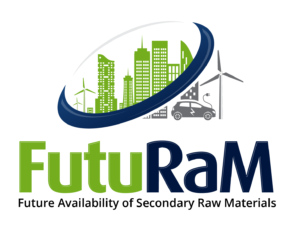The Future Availability of Secondary Raw Materials (FutuRaM)
- Project research area
- Circular Economy of Minerals
- Project duration
- 01.06.2022 - 31.05.2025
Introduction

The Future Availability of Secondary Raw Materials (FutuRaM) project will play a key role in ensuring a secure supply of secondary and critical raw materials from within the European Union. Geological Survey of Finland (GTK) is one of the 28 partners from around the Europe participating in the four-years project.
Access to important raw materials that the EU requires for its triple digital, energy and circular economy transition is becoming increasingly uncertain. Added to this, changes in the geopolitical situation, as the war in Ukraine highlights by drawing attention to, for example, the fact that Ukraine/Russia are sitting on 40% of the world supply of palladium, can cause sudden disruptions to the supply chain. Extracting more of these materials from waste streams that are rich in them, and predicting future demand, will help to mitigate the risks associated with this uncertainty and reduce reliance on other countries for their supply.
FutuRaM, funded through the European Union’s Horizon Europe programme, will develop the Secondary Raw Materials knowledge base on the availability and recoverability of secondary raw materials (SRMs) within the European Union (EU), with a special focus on critical raw materials (CRMs). The project research will enable fact-based decision making for the recovery and use of SRMs within and outside the EU, and disseminate the data generated via an accessible knowledge base developed in the project.
Access to raw materials drives the economy. It thus determines the competitive position of industry, and society’s ability to transition toward a decarbonised world. Some raw materials, such as palladium, lithium or cobalt, are deemed ‘critical’ because they are economically and strategically important for the economy but have a high-risk associated with their supply.
FutuRaM will establish a methodology, reporting structure, and guidance to improve the raw materials knowledge base up to 2050. It will integrate SRM and CRM data to model their current stocks and flows, and consider economic, technological, geopolitical, regulatory, social and environmental factors to further develop, demonstrate and align SRM recovery projects with the United Nations Framework Classification for Resources (UNFC), a tool that enables a better understanding of the viability of raw material projects. This will enable the commercial exploitation of SRMs and CRMs by manufacturers, recyclers, and investors, and the knowledge base developed in the project will support policy makers and governmental authorities.
FutuRaM will focus on six waste streams: batteries; electrical and electronic equipment; vehicles; mining; slags and ashes; and construction and demolition. These waste streams represent an important source of CRMs. For instance, in the manufacture of current electrical and electronic equipment, vehicles and batteries, 60% of global demand for gallium comes from optoelectronics and integrated circuits, 56% of indium from flat panel displays, 36% of tantalum from capacitors, 46% of cobalt, 32% of lithium and 8% of nickel from batteries, and 30% of rare earth elements from magnets.
This ambitious project will be delivered by a consortium of 28 outstanding partners from 11 countries across Europe. Leading universities and research institutes will combine their expertise with industry and industry associations to implement FutuRaM. Working closely with the European Commission and other relevant policy makers, the project will last for four years.
The main activities of GTK will concentrate on collecting mining related SRM information from Finland and participating in the development of the European secondary raw materials data base. Furthermore, GTK will investigate and model in more detail the ilmenite resources in the Otanmäki tailings area, together with the associated partner Otanmäki Mining Oy. GTK’s activities will also include laboratory-scale piloting of CRM recovery potential from Swedish mine waste material.
Contact person: Teemu Karlsson
Return to projects